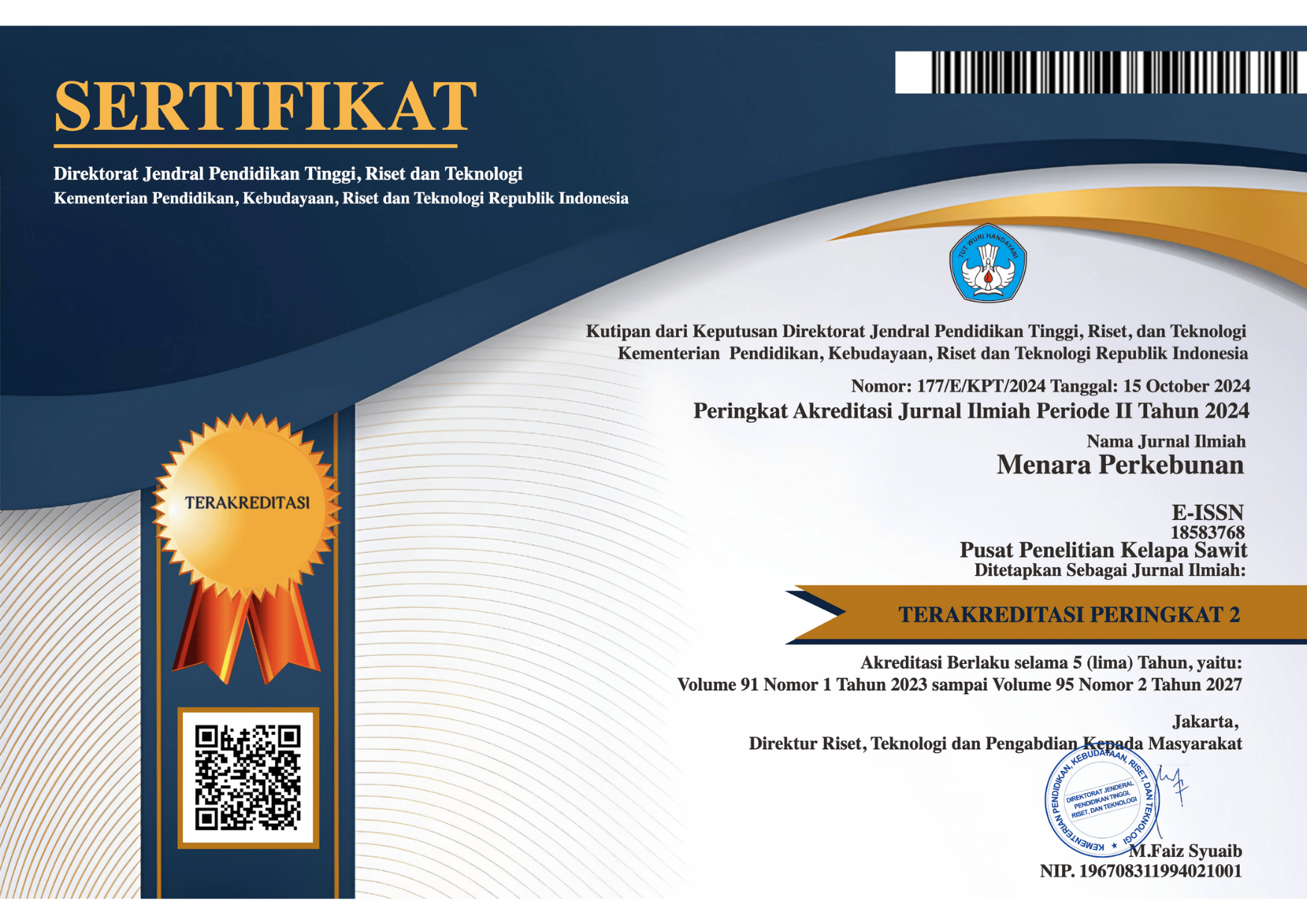Pengaruh TDZ terhadap induksi embrio somatik sagu (Metroxylon sagu Rottb.) pada tiga metode kultur berbeda (Effect of TDZ on the somatic embryo induction of sago palm (Metroxylon sagu Rottb.) in three different culture methods)
DOI:
https://doi.org/10.22302/iribb.jur.mp.v1i1.258Keywords:
[Key words, embryogenic callus, culture method, sago palm, RAM, SAM, cytokinin, TDZ]Abstract
Abstract
A right combination of cytokinin is able to support the process of callus differentiation to somatic embryo formation in plant somatic embryogenesis. Liquid culture application could increase the efficiency of in vitro culture process on plants. This research aimed to determine the best concentration of TDZ combined with kinetin for callus differentiation to somatic embryo of sago palm on three culture methods. Plant material used was embryogenic callus derived from tips meristem culture from sucker of Alitir sago palm. Callus was cultured on modified MS media added with: 0.0, 0.1, 0.5 and 1.0 mg/L TDZ combined with 0.5 mg/L kinetin for 12 weeks with subcultures every 6 weeks. Three culture methods used were suspension, temporary immersion system (TIS), and solid media. There were 12 treatments with 4 replicates. The results showed that the highest number of somatic embryos was achieved on TIS culture with 1.0 mg/L TDZ and 0.5 mg/L kinetin in 6 weeks (167.3 embryos/flask) and 12 weeks (389.2 embryos/flask) with its fresh weight of 18.4 g and 29.1 g, respectively. The highset survival rate in final culture (12 weeks) was achieved on TIS culture with 1.0 mg/L TDZ and 0.5 mg/L kinetin (100%). The shortest time for somatic embryos expression was achieved on TIS culture with 1.0 mg/L TDZ and 0.5 mg/L kinetin in two weeks after culture. Histological analysis of early-stage somatic embryos showed the presence of dense and compact cellular arrangements which formed growth spot axis for shoot or SAM (shoot apical meristem) and root or RAM (root apical meristem) that connected each other.
[Key words: culture method, embryogenic callus, Metroxylon sagu Rottb., kinetin, sago palm, TDZ]
Abstrak
Aplikasi kombinasi sitokinin yang tepat dapat mendorong proses diferensiasi kalus membentuk embrio somatik pada proses embriogenesis somatik tanaman. Penggunaan metode kultur cair dapat meningkatkan efisiensi proses kultur in vitro tanaman. Penelitian ini bertujuan untuk menentukan konsentrasi TDZ terbaik dikombinasikan dengan kinetin dalam proses diferensiasi kalus membentuk embrio somatik tanaman sagu pada tiga metode kultur. Bahan tanam penelitian berupa kalus embriogenik tanaman sagu asal kultur meristem pucuk dari anakan sagu jenis Alitir. Kalus dikulturkan pada media modifikasi dengan penambahan TDZ dengan konsentrasi 0,1; 0,5; dan 1,0 mg/L dikombinasikan dengan kinetin 0,5 mg/L selama 12 minggu yang disubkultur pada umur 6 minggu. Metode kultur yang digunakan terdiri atas tiga macam yaitu: kultur suspensi, sistem perendaman sesaat (SPS) dan media padat. Perlakuan terdiri atas 12 kombinasi perlakuan dengan empat ulangan. Hasil penelitian menunjukkan bahwa rerata jumlah embrio somatik tertinggi dicapai pada perlakuan metode kultur SPS dengan TDZ 1,0 mg/L baik pada umur kultur 6 minggu (167,3 buah) maupun umur 12 minggu (389,2 buah). Rerata bobot segar tertinggi juga diperoleh pada perlakuan metode kultur SPS dengan TDZ 1,0 mg/L pada umur kultur 6 minggu (18,4 g) dan 12 minggu (29,1 g). Rerata daya hidup kultur akhir (12 minggu) tertinggi sebesar 100% diperoleh pada perlakuan SPS. Induksi embrio somatik tercepat yakni setelah dua minggu diperoleh pada metode kultur SPS dengan TDZ 1,0 mg/L dikombinasikan dengan kinetin 0,5 mg/L. Analisis histologi embrio somatik stadium awal menunjukkan adanya susunan sel yang rapat dan kompak yang menyusun semacam poros atau berkas titik tumbuh tunas atau SAM (shoot apical meristem) maupun akar atau RAM (root apical mersitem) yang saling terhubung.
[Kata kunci: kalus embriogenik, metode kultur, kinetin, TDZ, sagu, Metroxylon sagu]
Downloads
Downloads
Submitted
Accepted
Published
How to Cite
Issue
Section
License
Authors retain copyright and grant the journal right of first publication with the work simultaneously licensed under a Creative Commons Attribution License that allows others to share the work with an acknowledgement of the work's authorship and initial publication in this journal.













